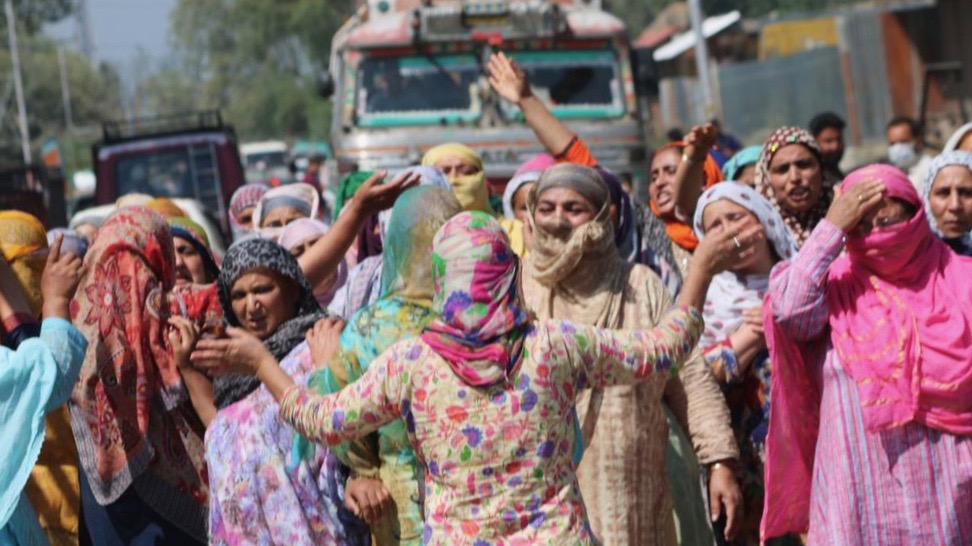Following the alleged custodial killing of 23-year-old Irfan Ahmad Dar on Tuesday, September 15, protests swept northern Kashmir on Wednesday. The family of the deceased have accused the state police of killing Irfan in cold-blood while he was in their custody after being arrested on September 14. Protestors, including hundreds of women, shouted slogans against the police and condemned the killing. The authorities responded by snapping 2G internet services in the neighboring Sopore region.
Irfan’s elder brother, Javaid Ahmed, in a video message that went viral on social media, said that the police had arrested him and Irfan after raiding their house in Siddiq Colony on September 14. “I was first arrested in the afternoon and kept in a separate section. My younger brother was taken a few hours later but I was let go as I was extremely sick,” Ahmed said.
As per the police, Irfan fled when they were going to recover arms and ammunition from a hideout, and was later found dead near a stone quarry. The family have rejected this claim. “My brother was innocent and a shopkeeper by profession. Police claim of the recovery of grenades is baseless, he was killed in cold-blood,” said Ahmad.
The death has invited widespread condemnation from across the region, with several human rights organizations blaming authorities for gross violation of rights. The family was also denied the right to bury Irfan in their ancestral graveyard.
Reacting to the incident, senior journalist Tariq Mir commented, “No amount of spin doctoring can cover up what is in plain terms a cold blooded murder. A state that employs such monstrous tactics as to torture young men to death can only face defeat, ignominy, and humiliation at the hands of the people it so cruelly represses.”
Shams Irfan, another journalist based in the region, wrote: “We know Irfan’s killers will never get punished or even identified. His family has to live with that pain. Like thousands of other helpless families in Kashmir live.”
Hours after the news of Irfan’s death, another civilian, Kausar Riyaz, was killed in Srinagar’s Batamaloo. The 45-year-old woman was killed on September 17 while security forces were carrying out counter-insurgency operations in the Firdousabad area of Batamaloo. Three militants were also declared dead in the encounter. As the news of casualties spread in the area, scores of youth hit the streets close to the encounter site and clashed with the government forces, who responded by hurling tear gas canisters and shotgun pellets.
In a similar incident on July 18, three laborers identified as 17-year-old Ibrar Ahmad, 25-year-old Imtiyaz Ahmad and 20-year-old Abrar Ahmed, were also found dead under mysterious circumstances in Shopian district of Kashmir. Their families feared they were killed by the government forces in a staged encounter.
Earlier, on March 19, a civilian from Awantipora, 28-year-old Rizwan Asad Pandith, who was a young school principal, was killed in police custody. Rizwan’s family confirmed that there were torture marks all over his body and the preliminary post-mortem found that he had “profuse bleeding resulting from multiple injuries.”
Since the reading down of Article 370 (which gave special status to Jammu and Kashmir) on August 5 last year, and the subsequent military clampdown, the police and security forces in Jammu and Kashmir have been accused of using excessive force while operating in the region.
Journalist attacked
On September 15, 24-year-old journalist Kamran Yousuf, who works with NewsClick, was physically assaulted while he was covering a gun battle in Marwal’s Kakapora in southern Kashmir. Kamran had previously spent at least six months in Tihar jail in 2017 after the authorities wrongly accused him of being an “over ground worker” for the militants. He was booked under the draconian Unlawful Activities Prevention Act (UAPA), and became the first journalist from the region to be booked under the controversial law.





